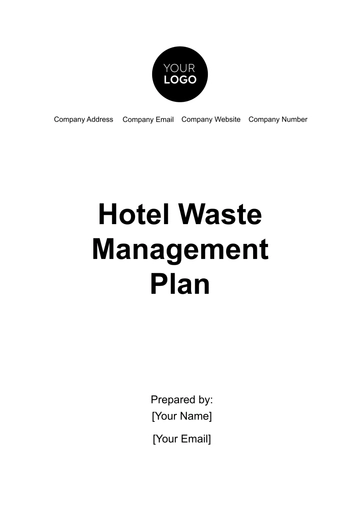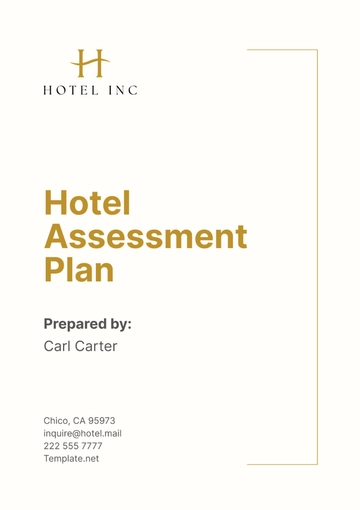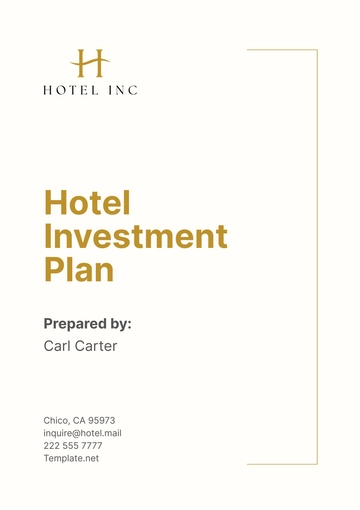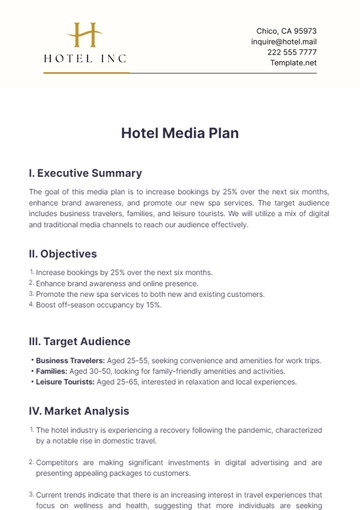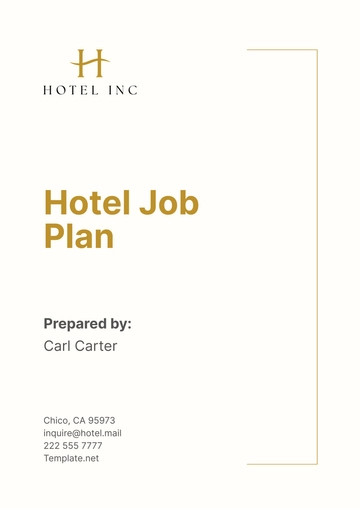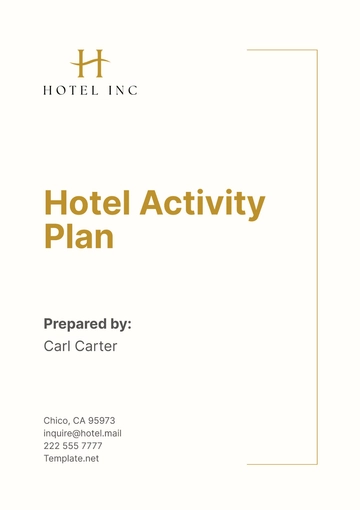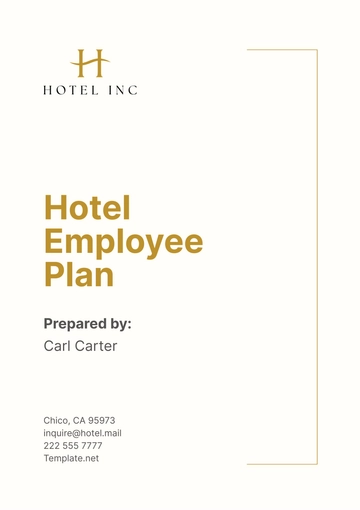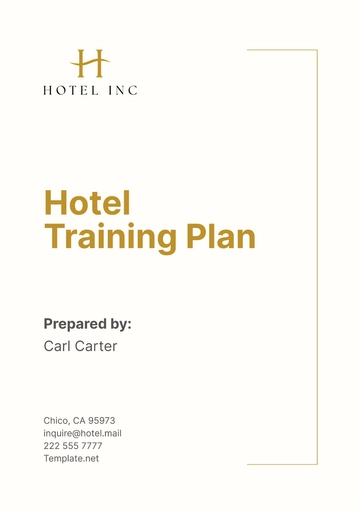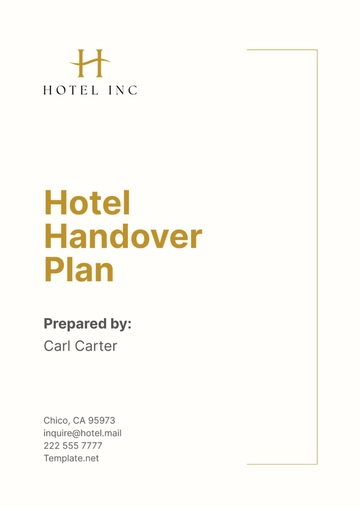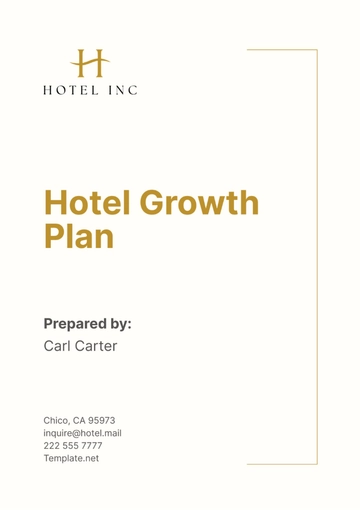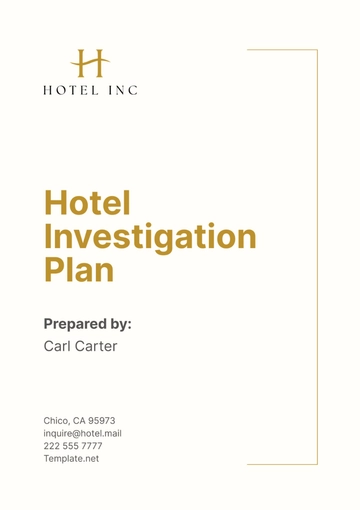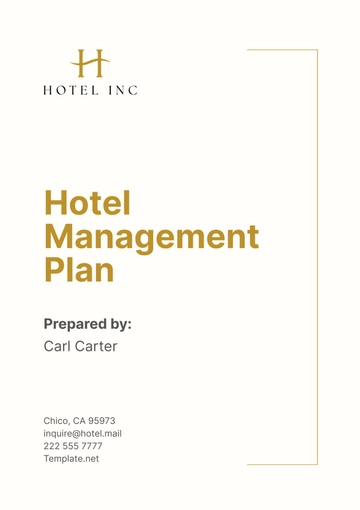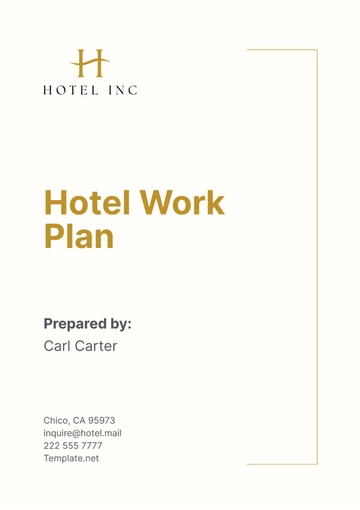Free Hotel Waste Management Plan
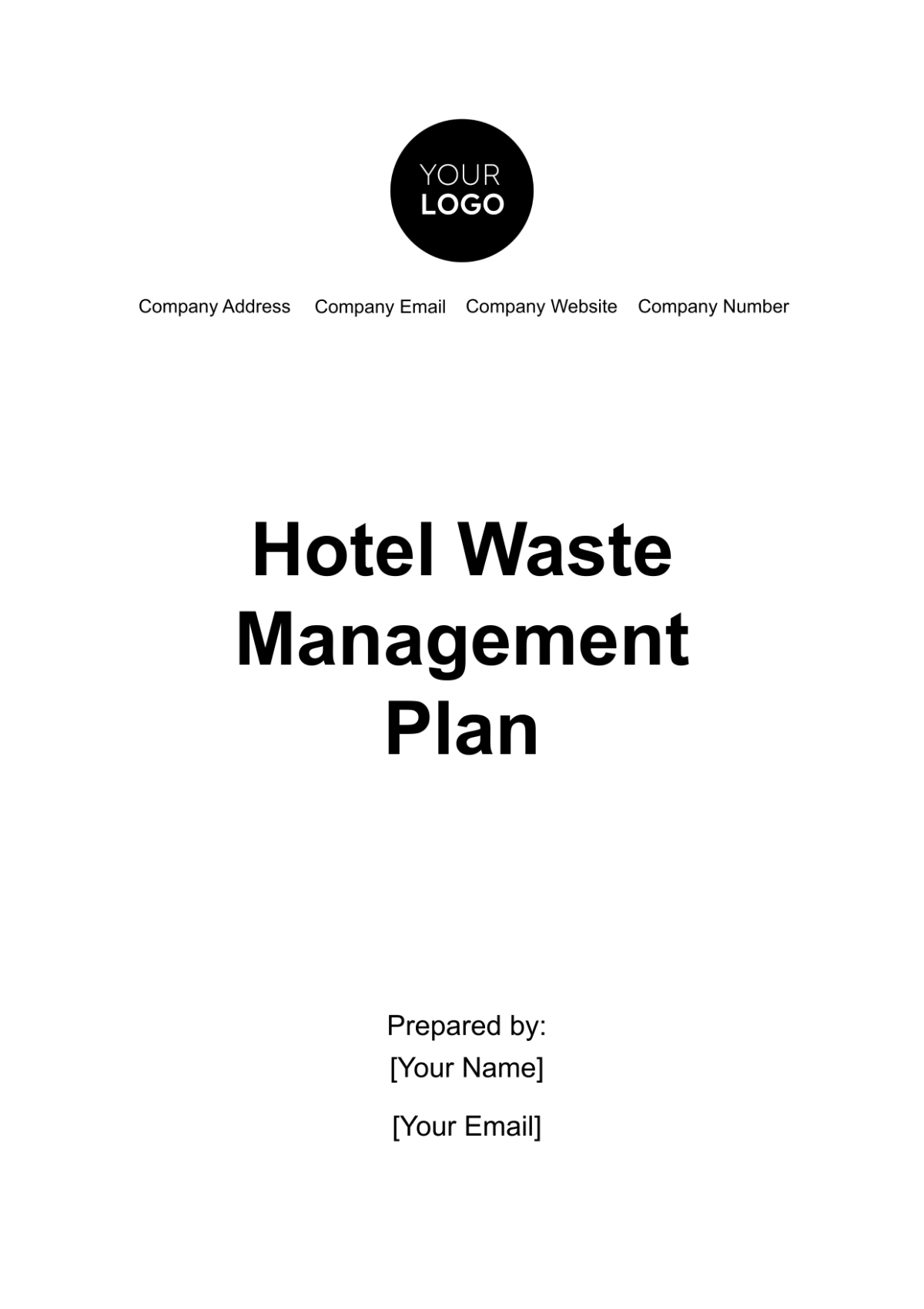
I. Introduction
This Waste Management Plan outlines the strategies and procedures that [Your Company Name] will implement to effectively manage waste generated by hotel operations. Our goal is to minimize waste, promote recycling, and ensure compliance with environmental regulations. By adopting sustainable practices, we aim to reduce our environmental footprint and enhance the overall guest experience.
Objectives of Waste Management Plan
Establishing clear objectives is essential for guiding our waste management practices.
Reduce Waste Generation: Implement strategies to minimize waste produced by hotel operations, promoting efficiency and sustainability. This includes initiatives to evaluate purchasing practices and reduce excess packaging.
Promote Recycling: Increase the percentage of materials recycled to divert waste from landfills and support resource conservation. We will track recycling rates and set specific targets for improvement.
Educate Staff and Guests: Foster a culture of sustainability by educating employees and guests about waste management practices and the importance of reducing waste. Regular training sessions and informational materials will be distributed to enhance awareness.
II. Types of Waste Generated
Understanding the types of waste generated is crucial for developing effective management strategies.
General Waste: Includes non-recyclable materials such as food waste, packaging, and other disposable items. Regular assessment of waste composition will help identify opportunities for reduction.
Recyclable Materials: Consists of paper, cardboard, glass, metal, and certain plastics that can be processed for reuse. Establishing a designated area for these materials will facilitate easier recycling.
Hazardous Waste: Involves materials such as cleaning chemicals and electronic waste that require special handling and disposal. We will maintain a clear inventory of hazardous materials and ensure safe disposal methods are in place.
III. Waste Segregation Procedures
Proper waste segregation is critical for effective recycling and disposal.
Designated Bins: Place clearly labeled bins for general waste, recyclables, and hazardous waste throughout the hotel, ensuring easy access for staff and guests. Color-coded bins will be used to facilitate proper sorting.
Training for Staff: Provide training on proper waste segregation techniques to all employees, emphasizing the importance of separating materials correctly. Refresher courses will be held annually to reinforce best practices.
Guest Education: Inform guests about the waste segregation system through signage in guest rooms and common areas, encouraging participation in recycling efforts. Informational brochures will also be placed in welcome packets.
IV. Recycling Program
A robust recycling program is vital for reducing landfill waste and promoting sustainability.
Partnerships with Recyclers: Establish partnerships with local recycling companies to ensure effective collection and processing of recyclable materials. Regular communication with recycling partners will help improve service efficiency.
Regular Audits: Conduct regular audits to monitor recycling efforts, assess the volume of materials recycled, and identify areas for improvement. Data collected will be used to adjust our recycling strategy as needed.
Incentives for Participation: Implement incentive programs for staff and guests to encourage recycling and recognize outstanding contributions to sustainability. This could include rewards or recognition for teams that achieve recycling milestones.
V. Hazardous Waste Management
Proper handling and disposal of hazardous waste are essential for health and environmental safety.
Identification of Hazardous Materials: Regularly identify and categorize hazardous waste produced by the hotel, such as cleaning supplies and batteries. A comprehensive inventory will be maintained for compliance and safety.
Safe Disposal Procedures: Follow all local regulations regarding the safe disposal of hazardous materials, ensuring compliance and reducing risk. We will develop relationships with certified hazardous waste disposal companies.
Employee Training: Train staff on the proper handling and disposal of hazardous waste, emphasizing safety protocols and legal obligations. Documentation of training sessions will be maintained for regulatory purposes.
VI. Waste Reduction Strategies
Implementing waste reduction strategies contributes to overall sustainability and operational efficiency.
Sourcing Eco-Friendly Products: Prioritize purchasing eco-friendly and recyclable products to minimize waste at the source. We will work with suppliers who adhere to sustainable practices.
Portion Control: Implement portion control measures in food and beverage service to reduce food waste and improve sustainability. Menu adjustments will be made based on guest preferences to minimize excess food.
Digital Documentation: Transition to digital documentation wherever possible to reduce paper waste and streamline operations. This includes using digital contracts and forms to minimize printing needs.
VII. Monitoring and Reporting
Regular monitoring and reporting are essential for assessing the effectiveness of waste management initiatives.
Reporting Mechanisms: Establish a reporting mechanism to communicate progress to management and stakeholders, fostering transparency and accountability. Monthly updates will be provided to senior management.
Continuous Improvement: Use audit findings to develop action plans for continuous improvement in waste management practices. We will set new targets based on historical performance and emerging best practices.
Waste Audits: Conduct waste audits quarterly to analyze waste generation patterns, recycling rates, and compliance with waste management goals. These audits will inform our annual sustainability report.
VIII. Employee and Guest Engagement
Engaging staff and guests in waste management efforts fosters a culture of sustainability.
Awareness Campaigns: Organize awareness campaigns and workshops for employees to promote the importance of waste management and sustainability. Participation in local environmental events will also be encouraged.
Guest Participation: Encourage guest participation in sustainability initiatives through information sessions, newsletters, and signage throughout the hotel. Feedback forms will be provided to gauge guest interest in sustainability.
Feedback Mechanisms: Create channels for staff and guests to provide feedback on waste management practices and suggest improvements. This could include suggestion boxes or online surveys.
IX. Budget Overview
Allocating a budget is crucial for implementing waste management strategies effectively.
Item | Estimated Cost |
|---|---|
Waste Bins and Segregation Supplies | $3,000 |
Recycling Partnership Fees | $2,000 |
Hazardous Waste Disposal Services | $1,500 |
Staff Training Sessions | $2,500 |
Awareness Campaigns | $1,000 |
Waste Audit Implementation | $1,500 |
Total Estimated Budget | $12,500 |
This budget outlines the necessary financial commitments to support our waste management initiatives. Investing in waste segregation supplies and training will significantly enhance our ability to reduce waste and improve recycling rates.
X. Conclusion
By implementing this Waste Management Plan, [Your Company Name] is committed to reducing its environmental impact while providing exceptional service to our guests. Through continuous monitoring, education, and engagement, we aim to create a sustainable hotel that prioritizes responsible waste management and environmental stewardship.
- 100% Customizable, free editor
- Access 1 Million+ Templates, photo’s & graphics
- Download or share as a template
- Click and replace photos, graphics, text, backgrounds
- Resize, crop, AI write & more
- Access advanced editor
Implement eco-friendly solutions with the Hotel Waste Management Plan Template from Template.net. This editable and customizable template helps you design a waste management strategy that reduces environmental impact. Use our Ai Editor Tool to personalize sections, strategies, and procedures for your hotel’s sustainability goals. Get a copy of our template now!
You may also like
- Finance Plan
- Construction Plan
- Sales Plan
- Development Plan
- Career Plan
- Budget Plan
- HR Plan
- Education Plan
- Transition Plan
- Work Plan
- Training Plan
- Communication Plan
- Operation Plan
- Health And Safety Plan
- Strategy Plan
- Professional Development Plan
- Advertising Plan
- Risk Management Plan
- Restaurant Plan
- School Plan
- Nursing Home Patient Care Plan
- Nursing Care Plan
- Plan Event
- Startup Plan
- Social Media Plan
- Staffing Plan
- Annual Plan
- Content Plan
- Payment Plan
- Implementation Plan
- Hotel Plan
- Workout Plan
- Accounting Plan
- Campaign Plan
- Essay Plan
- 30 60 90 Day Plan
- Research Plan
- Recruitment Plan
- 90 Day Plan
- Quarterly Plan
- Emergency Plan
- 5 Year Plan
- Gym Plan
- Personal Plan
- IT and Software Plan
- Treatment Plan
- Real Estate Plan
- Law Firm Plan
- Healthcare Plan
- Improvement Plan
- Media Plan
- 5 Year Business Plan
- Learning Plan
- Marketing Campaign Plan
- Travel Agency Plan
- Cleaning Services Plan
- Interior Design Plan
- Performance Plan
- PR Plan
- Birth Plan
- Life Plan
- SEO Plan
- Disaster Recovery Plan
- Continuity Plan
- Launch Plan
- Legal Plan
- Behavior Plan
- Performance Improvement Plan
- Salon Plan
- Security Plan
- Security Management Plan
- Employee Development Plan
- Quality Plan
- Service Improvement Plan
- Growth Plan
- Incident Response Plan
- Basketball Plan
- Emergency Action Plan
- Product Launch Plan
- Spa Plan
- Employee Training Plan
- Data Analysis Plan
- Employee Action Plan
- Territory Plan
- Audit Plan
- Classroom Plan
- Activity Plan
- Parenting Plan
- Care Plan
- Project Execution Plan
- Exercise Plan
- Internship Plan
- Software Development Plan
- Continuous Improvement Plan
- Leave Plan
- 90 Day Sales Plan
- Advertising Agency Plan
- Employee Transition Plan
- Smart Action Plan
- Workplace Safety Plan
- Behavior Change Plan
- Contingency Plan
- Continuity of Operations Plan
- Health Plan
- Quality Control Plan
- Self Plan
- Sports Development Plan
- Change Management Plan
- Ecommerce Plan
- Personal Financial Plan
- Process Improvement Plan
- 30-60-90 Day Sales Plan
- Crisis Management Plan
- Engagement Plan
- Execution Plan
- Pandemic Plan
- Quality Assurance Plan
- Service Continuity Plan
- Agile Project Plan
- Fundraising Plan
- Job Transition Plan
- Asset Maintenance Plan
- Maintenance Plan
- Software Test Plan
- Staff Training and Development Plan
- 3 Year Plan
- Brand Activation Plan
- Release Plan
- Resource Plan
- Risk Mitigation Plan
- Teacher Plan
- 30 60 90 Day Plan for New Manager
- Food Safety Plan
- Food Truck Plan
- Hiring Plan
- Quality Management Plan
- Wellness Plan
- Behavior Intervention Plan
- Bonus Plan
- Investment Plan
- Maternity Leave Plan
- Pandemic Response Plan
- Succession Planning
- Coaching Plan
- Configuration Management Plan
- Remote Work Plan
- Self Care Plan
- Teaching Plan
- 100-Day Plan
- HACCP Plan
- Student Plan
- Sustainability Plan
- 30 60 90 Day Plan for Interview
- Access Plan
- Site Specific Safety Plan


